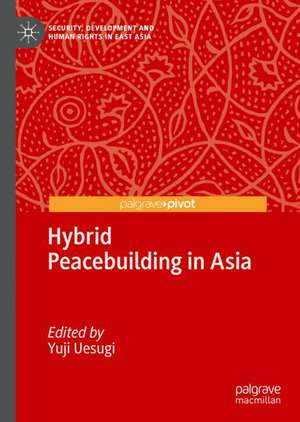Hybrid Peacebuilding in Asia: Security, Development and Human Rights in East Asia
Editat de Yuji Uesugien Limba Engleză Hardback – 16 iul 2019
Preț: 422.11 lei
Nou
Puncte Express: 633
Preț estimativ în valută:
80.77€ • 88.01$ • 68.06£
80.77€ • 88.01$ • 68.06£
Carte tipărită la comandă
Livrare economică 23 aprilie-07 mai
Preluare comenzi: 021 569.72.76
Specificații
ISBN-13: 9783030188641
ISBN-10: 3030188647
Pagini: 160
Ilustrații: XV, 156 p. 6 illus., 1 illus. in color.
Dimensiuni: 148 x 210 mm
Greutate: 0.44 kg
Ediția:1st ed. 2020
Editura: Springer International Publishing
Colecția Palgrave Pivot
Seria Security, Development and Human Rights in East Asia
Locul publicării:Cham, Switzerland
ISBN-10: 3030188647
Pagini: 160
Ilustrații: XV, 156 p. 6 illus., 1 illus. in color.
Dimensiuni: 148 x 210 mm
Greutate: 0.44 kg
Ediția:1st ed. 2020
Editura: Springer International Publishing
Colecția Palgrave Pivot
Seria Security, Development and Human Rights in East Asia
Locul publicării:Cham, Switzerland
Cuprins
1: Introduction.- 2: Asian Peacebuilding: Theory and Practice.- 3: A Typology of Mid-Space Local Bridge-Builders.- 4: Roles of Rebel Gatekeepers in Mid-Space Peacebuilding: A Case Study of Bangsamoro.- 5: Roles of Religious Leaders as Bridge-builders: A Case Study of Cambodia.- 6: Illiberal Peacebuilding in India and Indonesia: The Dangers of the Hybrid Approach.- 7: Conclusion.
Notă biografică
Yuji Uesugi is Professor at Waseda University, Japan, teaching conflict resolution, peacebuilding, and human security. He has worked as a peacebuilding practitioner in Timor-Leste, Bangsamoro, Cambodia, and Indonesia.
Textul de pe ultima copertă
“...A pioneering and innovative effort to integrate a variety of practical approaches to peacebuilding from different cultures while providing useful guidelines for practitioners.”
—Christopher Mitchell, Emeritus Professor of Conflict Research, School for Conflict Analysis & Resolution, George Mason University, USA
“This study is an innovative and important addition to the growing literature on hybrid peace.”
—Oliver Richmond, Associate Dean for Internationalisation, Department of Politics and International Relations, The University of Manchester, UK
“This work is a serious examination of how peacebuilding is enacted in Asian contexts, able to add to theory and concept-building on what we know about peace.”
—Roger Mac Ginty, School of Government and International Affairs, Durham Global Security Institute, Durham University, UK
This book explores hybrid peacebuilding in Asia, focusing on local intermediaries bridging the gaps between incumbent governments and insurgents, national leadership and the grassroots constituency, and local stakeholders and international intervenors. The contributors shed light on the functions of rebel gatekeepers in Bangsamoro, the Philippines, and Buddhist Peace monks in Cambodia to illustrate the mechanism of dialogue platforms through which gaps are filled and the nature of hybrid peace is negotiated. The book also discusses the dangers of hybrid peacebuilding by examining the cases of India and Indonesia where national level illiberal peace was achieved at the expense of welfare of minority groups. They suggest a possible role of outsiders in hybrid peacebuilding and mutually beneficial partnership between them and local intermediaries.
Yuji Uesugi is Professor at Waseda University, Japan, teaching conflict resolution, peacebuilding, and human security. He has worked as a peacebuildingpractitioner in Timor-Leste, Bangsamoro, Cambodia, and Indonesia.
—Christopher Mitchell, Emeritus Professor of Conflict Research, School for Conflict Analysis & Resolution, George Mason University, USA
“This study is an innovative and important addition to the growing literature on hybrid peace.”
—Oliver Richmond, Associate Dean for Internationalisation, Department of Politics and International Relations, The University of Manchester, UK
“This work is a serious examination of how peacebuilding is enacted in Asian contexts, able to add to theory and concept-building on what we know about peace.”
—Roger Mac Ginty, School of Government and International Affairs, Durham Global Security Institute, Durham University, UK
This book explores hybrid peacebuilding in Asia, focusing on local intermediaries bridging the gaps between incumbent governments and insurgents, national leadership and the grassroots constituency, and local stakeholders and international intervenors. The contributors shed light on the functions of rebel gatekeepers in Bangsamoro, the Philippines, and Buddhist Peace monks in Cambodia to illustrate the mechanism of dialogue platforms through which gaps are filled and the nature of hybrid peace is negotiated. The book also discusses the dangers of hybrid peacebuilding by examining the cases of India and Indonesia where national level illiberal peace was achieved at the expense of welfare of minority groups. They suggest a possible role of outsiders in hybrid peacebuilding and mutually beneficial partnership between them and local intermediaries.
Yuji Uesugi is Professor at Waseda University, Japan, teaching conflict resolution, peacebuilding, and human security. He has worked as a peacebuildingpractitioner in Timor-Leste, Bangsamoro, Cambodia, and Indonesia.
Caracteristici
Fills the existing knowledge gap in the literature on the special features of peacebuilding practices in Asia Links the concept of democratization to the concept of "hybrid peacebuilding" Presents a narrative of hybrid peacebuilding in Asia undertaken by an "illiberal" state and divorced from the state-building endeavor










